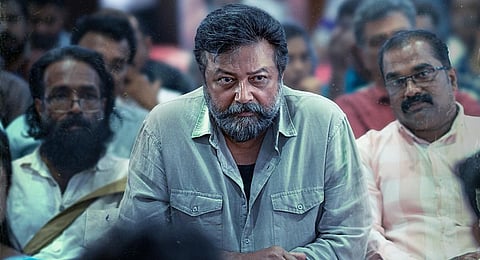

You can tell Midhun Manuel Thomas not only loves adding details in his films—even in scripts unwritten by him—but also gets a kick out of seeing his actors deliver all that information. The eagerness to please his audiences with intelligent-sounding thriller writing and common themes is apparent in Abraham Ozler too. The obvious advantage of this approach is that you not only get to lend a sense of richness to your film but also mask any writing shortcomings. In one quick scene, a major character—a much anticipated Mammootty cameo—reads Frederick Forsyth’s The Devil’s Alternative. It makes sense when you think that detailing is the USP of the acclaimed British author’s works, which I often sought for the same reason. In Abraham Ozler, let’s say the devil... is in the details.
Marketing a suspense thriller with the “emotional” tag seems to be the new trend. But when you announce something like that, you must stay true to your promise. It worked in the case of Jeethu Joseph’s Neru, which left us moved in the end, regardless of its few limitations. I bring up Neru because it had some strong performances working to its advantage. The same cannot be said of Abraham Ozler, which is too preoccupied with... details. It marinates in them for much longer than necessary, and you end up relishing the spices more than the dish they are supposed to be perfectly integrated with.
With Abraham Ozler, Midhun has found a writer, Dr Randheer Krishnan, whose sensibilities seem to align perfectly with his. Like Madhun’s script of Phoenix, Abraham Ozler too gives you the feeling of watching two movies for the price of one. However, the latter doesn’t suffer from the former’s tonal inconsistency. There’s a dark backstory with harshly wronged characters. There’s a tragic love story. There’s a man who loses his voice. There’s a man who is brutally humiliated and maimed. These are obvious attempts to make us empathetic towards them, but we don’t spend enough time with them to feel an emotional attachment. One thing it does, however, is manage to feel angry towards the perpetrators. It also helps that popular faces play these sympathetic characters’ older selves.
Mammootty, plays one of them, with an applause-worthy intro and a character name from one or more of his iconic movies. But this is a case of his heavy presence doing wonders for the film—and probably for Jayaram—than delivering greatly in terms of performance. Some might argue that this character—who becomes pivotal in the film’s latter portions—could’ve been played by a different actor, but I see Mammootty’s casting as a nod to his association with a certain kind of story we have often seen him in, not only in his early years but also recently. Perhaps Midhun wanted to achieve, with this casting choice, the mood of some of the “emotional” thrillers he watched while growing up, and I must say, he succeeds to an extent.
Don’t get me wrong, the film doesn’t lack the ability to hook us, but once the end credits started rolling, Abraham Ozler made me wonder whether it would’ve worked better as an airport novel than a film. Besides, whatever extraordinary quality or the impression of intelligence the film gives you initially dissipates once the dust settles. One can’t deny its ability to pull you into the illusion —the smokescreen if you will —of intriguing plot developments and preceding anticipation. The information delivery job is primarily of Jayaram as the titular Ozler, who is established as a man with a traumatic past, the after-effects of which trigger symptoms of severe insomnia. The remedy suggested by his shrink? To get too busy with work.
Fortunately, Ozler is still an efficient investigator who has the habit of going into a trance-like state and looking in a fixed direction when dishing out his deductions and talking normally in different circumstances. As interesting as this approach may sound, there are times when it borders on comical. Making things a bit awkward is having Jayaram and some of his fellow actors, including Mammootty, utter English dialogues.
Why this tendency to make your characters speak English? Do Korean filmmakers resort to English to tell their stories? Why not stick to Malayalam to say the simplest lines? This choice, as I said earlier, gives off the impression that the film is more intelligent than it appears to be, but you eventually realise it’s not. All that cool-sounding jargon delivered mechanically is off-putting at times, and so are the few attempts of spoon-feeding and exposition. Would it have hurt to leave some things for the audience to decipher on their own?
To be fair to the technical team, Midhun Mukundan’s ominous score and Shameer Muhammed’s urgency-creating editing do enough to keep us invested. I only wish the characters looked more like people than mere vessels to deliver the dialogue or advance the plot. I would’ve liked to see something more than a cinematic extension of big stars reading passages from a good novel. Let me bring up a recent example from Tamil cinema, Por Thozhil, which, despite looking simple, achieved a lot in terms of emotional impact, technical finesse, and thrills. In comparison, Abraham Ozler (or recent examples like Garudan and Phoenix) comes up short. Now, why compare, you might ask? Well, if we are talking about an “emotional thriller”, I found this to be a good enough example.
Film: Abraham Ozler
Director: Midhun Manuel Thomas
Cast: Jayaram, Mammootty, Senthil Krishna, Saiju Kurup
Rating:3/5